
This isn't a question that most people will think to ask unless they're confronted with the distressing experience of discovering a deceased person.
Whether this involves a family member or a stranger, finding a deceased human body will cause a certain amount of emotional trauma. However, it's vitally important that you follow the correct procedure, and for this, you'll need to remain calm and practical to some degree.
As part of our professional cleaning operation, Clean Team Scotland offers an unattended death cleaning service. Using our considerable knowledge and experience, we've created this blog to guide you through the process. This will provide you with all the facts you need, should you encounter this scenario.
Whilst we realise the need for sensitivity and compassion, it's necessary to use practical terms that may seem harsh or insensitive at times. This is purely out of professional detachment and is never meant to cause offence.

The short answer as to who is responsible for cleaning up after a death is this: it depends. In hospitals, care homes or any medical facility, cleaners and nursing staff handle everything. And if a person dies at home, outside of medical care, the death is usually known about or discovered quickly, so unattended death cleanup is rarely required. In these cases, the family usually take care of any cleaning as there's little danger of contamination.
For the most part, we're focusing on unattended deaths, where the body has remained undiscovered for some time. And in almost every single instance, a trauma cleaning or biohazard cleaning service will be required.
We'll explain this further in the next section...
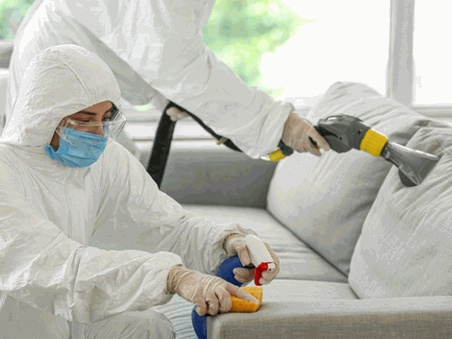
The first task is to establish whether expert cleaning is necessary. To answer this, we need to know a few details, such as:
Did this happen in a private home, care home, abandoned building, place of work, on the street, etc.? This point is relevant as it denotes who is responsible for death cleaning services. In the case of medical establishments, they have their own reporting procedure and will sort out any cleaning needs.
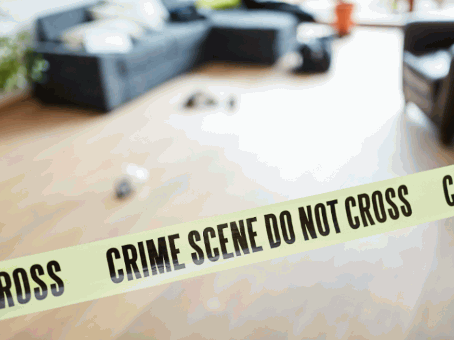
Was the death due to natural causes or was it related to a violent crime, accident or suicide? If it's a crime scene, then the police will have to check the site for evidence. Also, the site of a suicide or violent death may contain biological hazards such as blood and other bodily fluids.
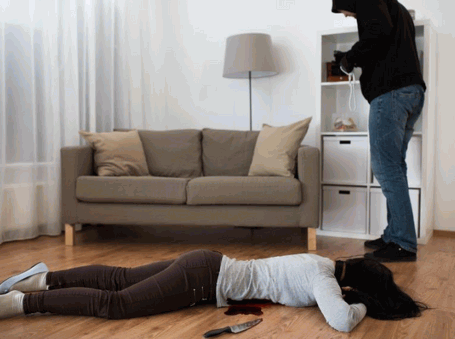
How long has the person been dead? Decomposition can begin as early as one day after death, depending on the conditions. This means that biohazard cleaning will be necessary.
Of course, if you discover a body it's unlikely that you'll be able to answer all of these questions - that's up to the emergency services and experts to decide. However, it's your duty to report the death to the appropriate authorities, and they'll answer the questions for you.
After this, the authorities will decide whether crime scene cleanup or undiscovered death cleaning services are required.
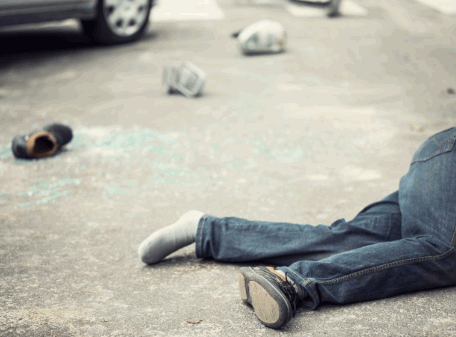
It often comes as a surprise to most people when they learn that the emergency services don't provide crime scene cleanup or unattended death cleaning services.
Once they have played their role, they leave the scene and it's then it's up to someone else to arrange for the cleaning process to take place.
Under the current laws, responsibility for trauma cleaning or crime scene cleaning generally falls to the property owner, although there are a few exceptions.
Here's a brief guide to illustrate this more clearly:
If the death occurs in a rented or privately owned property, the property owner or landlord is typically responsible for ensuring the property is clean and safe for future use. This applies to domestic, commercial and industrial buildings, whether they are in use, empty or derelict.

In private residences, responsibility often falls to the deceased’s next of kin or the executor of their estate. This includes arranging or paying for cleaning if needed.
In council or social housing, the local authority or housing association may step in, but costs may be billed to the deceased's estate or next of kin.
In cases of workplace fatalities, employers are legally required to ensure the site is cleaned to health and safety standards.
This is more complex, as boundaries are sometimes vague or disputed. However, where ownership is established, the legal owner of the site bears responsibility for cleaning and biohazard remediation, whether it's a private individual, corporation or local authority.
So, now we have a clearer picture of who is responsible, let's move on to look at the cleanup process in more detail.
Also known as forensic cleaning or trauma cleaning, these teams are hired to remove biohazardous materials from the affected areas and ensure that the site is fully decontaminated and sanitised.
Wearing full personal protective equipment and specialist equipment, they work in a professional manner to eliminate any potential health risks from contaminated areas. These health hazards include viruses, diseases and bacteria found in blood and bodily fluids on walls, floors, ceilings and other surfaces, as well as any porous or absorbent materials on site.
Any contaminated materials that cannot be cleaned thoroughly are treated as hazardous waste and these are bagged, labelled and disposed of at a local hazardous waste disposal centre.
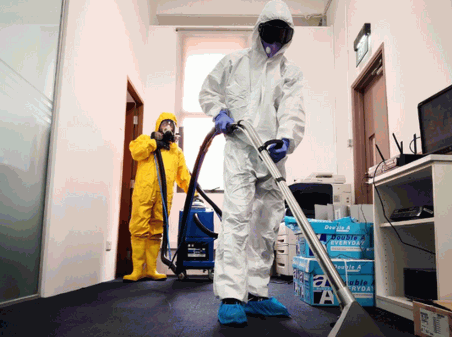
Crime scene cleaners will often be the same fully-trained teams that handle any other unattended death cleaning project.
The only difference when it comes to crime scenes is that police presence may be heavier, as they will need to investigate the site for evidence. However, they tend to leave the scene once it has been released for cleaning.
In either case, the specialist cleaners treat the death scene with the utmost respect for all involved, not least the victim.
Have a look at our post "Who cleans up crime scenes".

Realistically speaking, you can't - and you should certainly not try!
The risk from bloodborne pathogens, such as hepatitis b, hepatitis c, HIV/AIDS and MRSA (and others!) is too great. Wiping bleach on the affected areas won't do the trick - you need proper training to handle biohazardous material and prevent cross-contamination.
Even small traces of body fluids left unattended can result in foul odours, and potential pathogens may lead to serious health issues.
For these reasons, it's essential to leave this important task to a bioremediation company, as they are trained to do the job with minimal disruption and absolute efficiency. They also follow all safety measures and ensure that the affected area is thoroughly clean and sanitised.
Get in-depth information in our post "How to clean up after an unattended death".
We touched on this briefly above, but it's worth spelling it out clearly again:
In the majority of cases, the property owner will pay for unattended death cleaning services, including crime scene cleanup. There are exceptions, although these are rare.
If you think that this law is unfair, we can't really argue with this fact, especially when the average cost of trauma cleaning is £3,500.
However, unattended death cleanup needs to be paid for, as it's a professional service requiring training, expertise and special equipment. It's well worth checking your insurance policy as it may include an unattended death cleaning clause. If it doesn't, then have a chat with your insurance provider to see if they can add this. Hopefully, you won't need it!
Otherwise, you might want to contact your local authority or a bereavement charity as they may have a discretionary fund for cases like this.
Finally, if or when you require professional and efficient undiscovered death cleaning services, contact Clean Team Scotland for a free quote.




